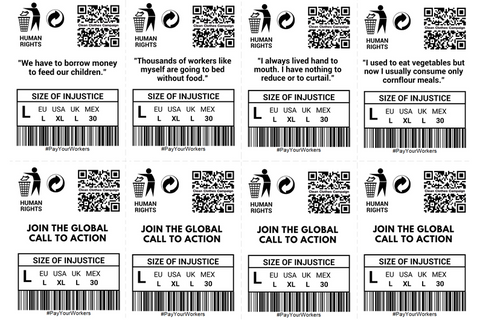PAY YOUR GARMENT WORKERS
The Clean Clothes Campaign grew out of direct solidarity and is still a backbone of their work - linking the people who make our clothes to the people that buy them

After the Rana Plaza disaster in 2013, The Accord on Fire and Building Safety in Bangladesh was created making real change in making factories safer, especially where in Bangladesh, there has been a long history of factory incidents.
(A new International Accord was created in August 2021. This Accord continues the work in Bangladesh and allows for expansion to other countries.)
The Rana Plaza Arrangement was a ground-breaking initiative to deliver loss of income payments to those families impacted, alongside medical care.
However, workers are not only threatened by unsafe buildings.
"Dangerous practices, such as the unprotected use of chemical substances or sandblasting, continue to be common in the industry. And even workers behind the sewing machine are exposed to health hazards, such as noise, high temperatures and repetitive motion. Fainting is common in factories where workers make long hours without proper ventilation or air conditioning and are paid too little to properly feed themselves. Also workers are subjected to verbal and psychological harassment and violence, especially the majority of women in the industry, who additionally potentially face gender based violence and sexual harassment." [1.]
The Clean Clothes Campaign grew out of direct solidarity and which is still the backbone of their work - linking the people who make our clothes to the people that buy them:
"The Clean Clothes Campaign started with a group of women workers in the Philippines fighting to get their wages. A group of women in The Netherlands organised in solidarity and their collective actions (in front of C&A shops and in the Philippines) led to a victory for the women. Since those actions in 1989, we have collectively taken up factory-level labour violations on request of workers in dozens of cases across Central America and Mexico, Asia, and Southern Africa. This results in supporting workers and their organisations in more effectively engaging with brands and employers to secure remedies to labour rights violations as well as securing space for workers to safely organise and thereby strengthening workers’ collective power.
Our global alliance extends to more than 200 non-government organisations and trade unions in 40 countries with special interest for women’s rights, consumer advocacy and poverty reduction. It connects the energy, knowledge, care and power of people as citizens, workers, consumers and activists to make sure that all workers can exercise their human rights.
[...] By connecting the dots of the global supply chain, we put pressure on where the power and money lies."[2.]
They "risk their health working in crowded factories without sufficient protection and risk their livelihood if they are sent home without pay. Brands and retailers need to act to protect the workers who have enabled their profits in the past.
Garment workers should not be paying the price for the COVID-19 pandemic."[3a.]
Many global brands had put in orders for garments, but then refused to pay up due to the pandemic crisis. Billions of finished goods that garment workers had spent hours working on in dangerous conditions were left unpaid for. Garment workers were laid off without pay as a direct result.
As brands are now putting in orders again they are asking for 10-50% off for products. Manufacturers are asking 40% off workers' wages.[3b.]
The Clean Clothes Campaign demand that brands need to:
1. #PayUp for what they ordered
2. Assure that workers receive their wages in full
3. Prevent workers from going penniless again
4. Stop union-busting under the guise of Covid-19
5. Ensure that workers are kept safe
You can tell brands to #PayUp & #PayYourWorkers
Has your favourite brand paid up? Find out here, check which brands have paid, and which still haven't with this brand checker:
https://www.workersrights.org/issues/covid-19/tracker/
It would take just ten cents per t-shirt for brands to make sure garment workers survive the pandemic.[4.]
You can find out more on the following websites:
- Pay Your Workers - https://www.payyourworkers.org
- Pay Up Fashion - https://payupfashion.com/the-problem/
- Clean Clothes Campaign - https://cleanclothes.org/
- To find out which brands have and haven't yet signed the Accord:
https://cleanclothes.org/campaigns/protect-progress/brand-tracker
- Take action with garment labels at https://cleanclothes.org/file-repository/pyw-labels-1.pdf/view
Sources cited:
1. https://cleanclothes.org/unsafe-workplaces
2. https://cleanclothes.org/direct-solidarity/
3. https://cleanclothes.org/covid-crisis/
4. https://www.payyourworkers.org/reports
